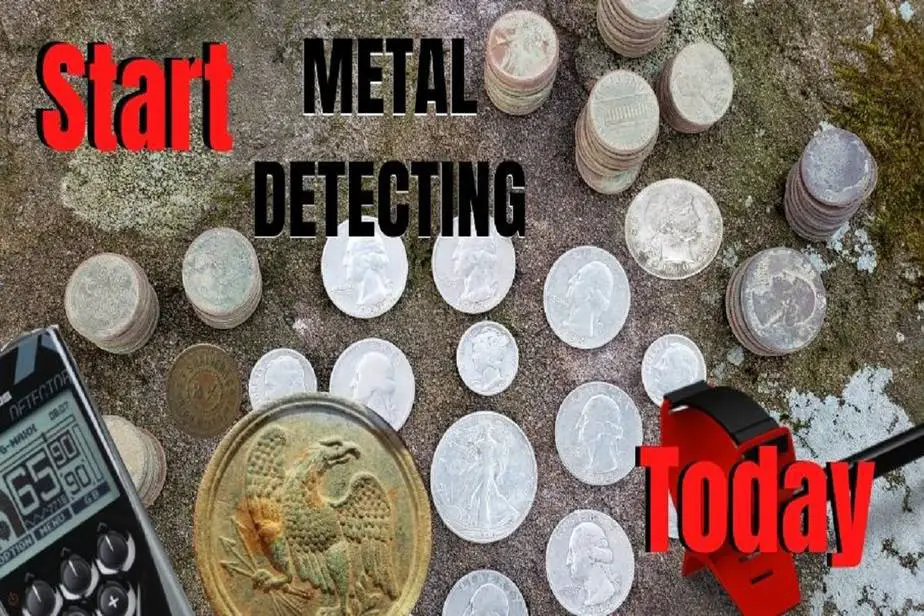Metal Detecting is hobby enjoyed by millions of folks spread across the globe. To most detectorists, metal detecting provides the thrill of finding an old and sometime silver coin, relic, or historic artifact that has been lost for 100s or even thousands of years. There are many ways to metal detect. You can metal detect on land, underwater, and even on the wet sandy beaches or in the surf. No matter what type of metal detecting you may be interested in this article will help you get started.
If you are thinking about getting started in this hobby called Metal Detecting but don’t know how, this article is for you. This article will cover numerous topics and provide recommendations that will help get you started today.
20 Tips to Help You Start Metal Detecting Today.
Before you spend a lot money and jump into the deep end of metal detecting, take a look at the 20 tips below. It may be the smartest thing you do prior to jumping in way over your head.
- Buy a metal detector that fits within your budget. Don’t go over board. Getting started can cost a lot of money (continue reading for our metal detector recommendations).
- Start in your own back yard. You never know what lies beneath your own property.
- Be very patient when you start to metal detecting. You will have good days and you will have bad days. Expect more bad days in the beginning.
- Expect to dig a lot of junk or trash in the beginning. This is completely normal and expected.
- Dig everything to understand the good targets from the bad. I can’t stress this enough. The more you dig the shorter the learning curve will be.
- Bury some targets of your own to test out the different sounds. Bury items like a ring, coin, silver coin, bottle cap, pull tab etc. This technique will also shorten your learning curve. Listen to the audio difference to each target.
- Carry a digging pouch, bag, or something to put your treasure and trash in. Otherwise, your pockets will be very dirty and some items may actually cut you.
- Always discard your trash or junk properly. Don’t leave trash behind or bury it back in the hole.
- Leave the ground the way you found it. In other words, fill in and cover your dig holes.
- Double check your holes before filling them back in. Many times there will be other coins in the same hole. This is what we call a COIN SPILL!
- Always seek and obtain permission before you start to metal detect.
- Share some of your finds with the property owner. This could earn you a return visit and give you a good reputation that may open up other permissions.
- Do not trespass! Trespassing can get you in deep trouble with the law. Always get permission wherever you go.
- Metal Detect after it rains. Targets in the ground become more conductive. This is especially true for SILVER coins.
- Take a good shovel or trowel to dig nice clean plugs (continue reading for our shovel recommendations).
- Beach detect at low tides. This will give you the best chance at finding those gold rings along the surf line.
- Do your own research to find good permissions. Look online for old maps of your area and find those locations where old house sites used to be. You can find old maps on some of these web sites Historicmapworks.com, Oldmapsonline.org, and Topozone.com.
- Spend some time on YouTube and watch others setup and use the same metal detector you have. This can really help you shorten the learning curve of learning your machine.
- Join metal detecting groups on Facebook and ask questions. There are many out there. Find the ones you like and don’t be afraid to ask questions.
- Search Google for metal detecting blogs and how-to articles on metal detecting. You can find a lot of good information but you can also find a lot of bad information. Trust but verify the information.
What Kind of Equipment Do You Need to Start Metal Detecting?
You only need 3 items to start metal detecting but I’m going to list 4. Here are the 4 “must-have” items to start metal detecting:
- Metal detector. There are plenty of good metal detectors to choose from. If you are just starting out, I don’t recommend spending thousands of dollars on a high end machine you may not like. Instead start out with an inexpensive metal detector. (See below for our recommendations).
- Digging bag or pouch. A bag or a pouch is something you really need to carry out your treasure and trash. There are many to choose from but if you want some ideas check these digging bags and pouches.
- Shovel or sand scoop A shovel can be a hand held digging trowel or a regular shovel. However there specific shovels that are specifically designed for metal detecting. I will go into more detail about metal detecting shovels a little further down the article. Sand scoops are used primarily at beaches. However if you are metal detecting lakes or swimming sites where they truck in sand for their beaches etc., then a sand scoop might be worth taking a long. There 2 brands of sand scoops worth checking out and they are Sito and RTG. You can find out more information here.
- Pin-Pointer also known as a “pin-point probe”. Almost everyone who metal detects today uses a pin-pointer and I think you will probably want one sooner rather than later. A pin-pointer isn’t necessary but a good option to have. These items are used to find/locate (aka pin-point) the item your are pursuing either in the hole or in the plug that you just opened up. Pin-pointers cut your recovery time in half. Many pin-pointers are now fully submersible and waterproof.
I highly recommend 2 pin-pointers the XP MI-4 or the XP MI-6. I have been using these pin-pointers for over 3 years and they are great. I also recommend the Garrett Pro-Pointer. This is also referred to as the Garrett Carrot. I’ve owned several Garrett Pin-Pointers over the years. I’ll list these and some of the more popular pin-pointers below where you can find out more and check out their current prices.
| Pin Pointer | Amazon Price | Kellyco Price | Fort Bedford Price |
| XP MI-4 | Current Price | Call 855-997-4439 | Call 814-215-1732 |
| XP MI-6 | Current Price | Call 855-997-4439 | Call 814-215-1732 |
| Garrett Pro-Pointer | Current Price | Current Price | Call 814-215-1732 |
| Minelab Pro-Find 35 | Current Price | Current Price | Call 814-215-1732 |
| Nokta Makro PulseDive | Current Price | Current Price | Call 814-215-1732 |
Consider These Additional Items.
- Gloves – Pick up a decent pair of gloves. After all you are going to be digging up dirt and its not a bad idea to wear them. There is a high possibility that if you didn’t wear them you would end up cutting one of your fingers or hand. There is a lot of trash in the ground. Broken bottles, shredded aluminum cans are just a few of the trashy items you will encounter so be careful and wear a gloves.
- Knee Pads – knee pads are a good idea especially if you have bad knees. They aren’t going make it easier to get up but they will make kneeling down more comfortable. They also save your pants from getting muddy or wet. You can find them at your local hardware store or on Amazon.
- Magnifier – If you have trouble seeing up close a magnifier is a must have for your digging bag or pouch. Its always nice to see the detail of your special finds up close. I never leave home without one. Kellyco has a great selection of them on their website.
3 Great Starter Metal Detectors for Under $300.
If you are just starting to metal detect I highly recommend one of these 3 affordable metal detectors that have great reviews and work really well.
All 3 of these metal detectors are easy to use (turn on and go) and they are very affordable. If you want more information on these metal detectors please check out this article.
Looking for a More Advanced Metal Detector?
If you aren’t interested in a good starter machine and want something more advanced I have 4 other metal detectors that are proven to be great machines and you can’t go wrong with any one of them.
Curious about the difference between the Equinox 600 and 800 check out the video below.
But What About The Kids? Are There Metal Detectors for Kids?
Metal detectors come in all shapes and sizes. They even make them for kids and young adults. Its important to that the metal detector you choose for your child isn’t too heavy for them to carry around. We have a buyers guide Kids Edition located here or click the image below. The guide provides the following information:
- Cost of Kids Metal Detectors by age.
- What you should expect from a kids metal detector.
- The various features that are included.
- Recommended metal detectors for kids ages 4 -10.
- Recommended metal detectors for kids 10 and older.
- Recommended metal detectors for young adults
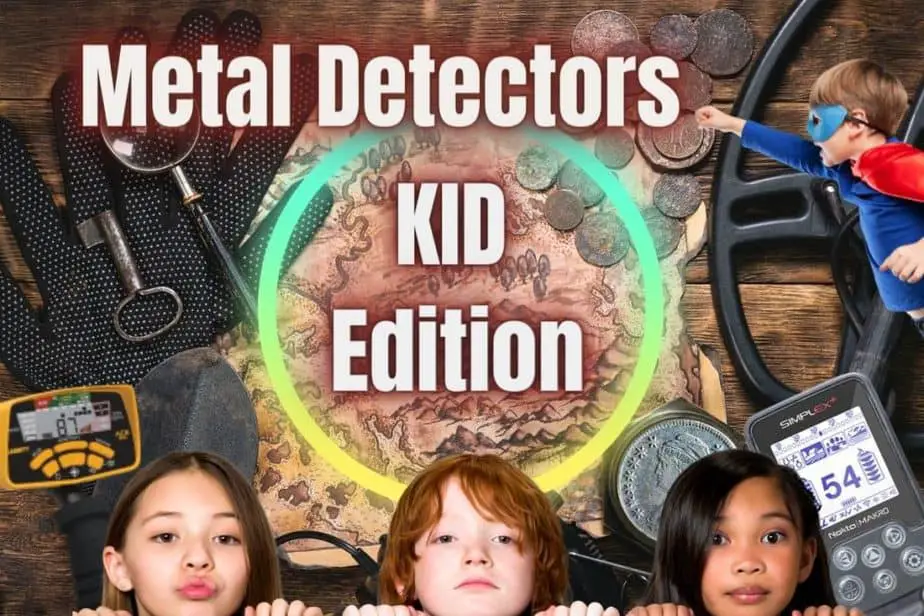
Based on the article above we pulled out a few tables from the article as a reference here. We highly recommend checking out the article to read more about metal detectors for kids.
Recommended Metal Detectors for Kids ages 4 -10
| Brand | Weight | Battery Type | Kellyco Price |
| Bounty Hunter Junior | 1.13lbs | 2 (AA) | Check for the latest Price |
| Bounty Hunter Junior T.D.I | 1.5lbs | 2 (AA) | Check for the latest Price |
| Nokta Makro Mini Hoard | 1.9lbs | 2 (AA) | Check for the latest Price |
| Minelab Go-Find 22 | 2.2lbs | 4 (AA) | Check for the latest Price |
Recommended Metal Detectors for Kids Ages 10 Years and Older
Young adults are going to require a metal detector that is a little more advanced that includes a few more features like discrimination, increased depth, better target ID, bigger search coil etc. Here are some recommended metal detectors for young adults.
| Brand | Weight | Battery | Kellyco Price |
| Fisher F11 | 2.3lbs | 9 Volt (1) | Check for the Latest Price |
| Fisher F22 | 2.3lbs | AA (2) | Check for the Latest Price |
| Garrett Ace 200 | 2.75lbs | AA (4) | Check for the Latest Price |
| Garrett Ace 250 | 2.7lbs | AA (4) | Check for the Latest Price |
| Garrett Ace 300 | 2.8lbs | AA (4) | Check for the Latest Price |
But What About Digging Tools? You Will Need Something to Dig with.
No matter what type of metal detecting you are going to do, you will need something to dig up your treasure. Lucky for you there are countless options out there but only a few brands that stand the test of time. As the author of this article I can personally say that I’ve owned all of the shovels and trowels referenced below and all of them have their purpose.
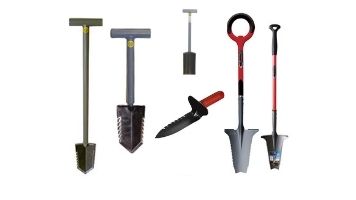
Earlier in the article I mentioned that a shovel or trowel was 1 of the 4 “must have” items for metal detecting. If you are just starting to metal detect, look around your house and find a garden trowel or regular shovel. They will work fine for digging around your own yard.
However, if you are going to start metal detecting in public parks, school yards, private property etc., then you are going to want to invest in a shovel that is designed for metal detecting.
Metal detecting shovels are designed to make a small hole or plug that is easily filled back in. Its important to take care in digging your holes. The neater they are, they easier they are to fill back in. Plus, you stand less of a risk of ruining the grass and/or getting told not to come back.
In a previous article I recommended 6 really great shovels for metal detecting. I’ll include the table of all 6 shovels below. I highly recommend a Lesche shovel. If you want to read the article it goes into more detail about each shovel. You can find the article here.
Here are 6 Excellent Shovels to Chose From (taken from the article).
| Metal Detecting Shovel | Amazon Price |
| Lesche Sampson 31″ T Handle | Check Price |
| Lesche Sampson 18” T Handle | Check Price |
| Lesche Ground Shark 31″ | Check Price |
| Lesche Standard Digging Tool | Check Price |
| Radius Garden Root Slayer Shovel (O Handle) | Check Price |
| Radius Garden Root Slayer Nomad Shovel | Check Price |
Where Can You Start Metal Detecting?
Now that you have ordered or received all your metal detecting gear, you are going to want places where you can “legally” metal detect. But where can you go?
You can metal detect anywhere you can obtain permission to do so. However, some places don’t require permission but its a good idea to check the rules/laws before you metal detect public parks, school yards, etc. Sometimes its not entirely clear if you can or can’t metal detect at these locations so use caution and common sense before you pop open that first plug.
To help get you started, I’m providing several places (below) where you can usually metal detect but exercise caution and make sure you can actually swing a metal detector at some of these places before you do so.
8 Great Places to Start Metal Detecting.
Even though these locations are generally hit pretty hard by other detectorists, they are also great places to learn how to metal detect. Plenty of coins and objects get lost every year at these locations. This is especially true for school yards, playgrounds, and public parks.
Below is a list of 8 good places to metal detect especially if you are a new to this hobby.
- School Yards.
- Playgrounds.
- Public Parks.
- Old Churches.
- Fair Grounds.
- Farm Fields.
- Beaches.
- Private Property.
Remember, always seek and get the permission to metal detect first. You don’t want the police to show up. Its always a good idea to get the name and phone number of the owner just in case the police do show up. That way you can prove that you have the permission. (See more about getting permissions below).
How To Get Permission To Metal Detect.
Getting permission to metal detect seem easy enough right? Well it isn’t unless you have really nice neighbors and friends who will let you dig holes in their ground. Truth be told, getting permission to metal detect is a lot harder to do than learning how to metal detect. Some people just can’t get up the nerve to talk to another human being. However, some don’t have a problem with it at all and they are the ones who seem to always find the best treasure.
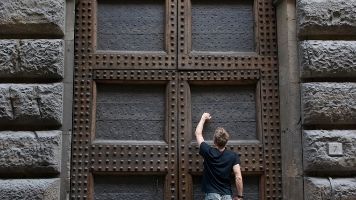
Getting permission to metal detect is one of the biggest hurdles for some beginners. Many of you will give up on the hobby because you won’t or you are afraid to knock on doors to get the permission.
Fortunately, I have 12 hot tips and a video that will help anyone who has a fear of knocking on doors overcome their fear and land some great permissions.
12 Hot Tips To Get Metal Detecting Permissions.
- Friends and family. Ask Friends and Family if they know or live in any old homes or know of any family or friends who have old farms etc. This is the easiest way to get a permission.
- Knock on doors. This is the least favorite but if you do some research and know a little bit about the property you are pursuing, the conversation with the property owner will go a lot better. Sometimes you may actually know more about the history of the property than the land owner.
- Mail a Letter. Sometimes its difficult to catch the owner at home and sometimes they just won’t answer the door if they don’t recognize you. Mailing them a letter may help but make sure you provide your contact information so they can contact you back.
- Create a flyer to take with you. On one piece of paper write up what you do, what you like to find and what you won’t do to the property i.e. leave holes opened, leave trash behind etc. Also include your contact information just in case the land owner wants to think about it.
- Provide Business Cards. Along with a flyer I also recommend providing business cards to the property owner especially if you get the permission. Give the owner a handful so he/she can give them out to other friends who might be interested in metal detecting their property as well.
- Bring Photos. Take along some photos of things you have already found as a conversation piece. Giving the land owner something to look at while you are talking to them. This takes the pressure off of you and focuses their attention on the photo and will probably get you that permission.
- Bring Along Some Items You Found. I always bring along some of the things I’ve found to help break the ice. I’ll include things like jewelry, coins, silver coins, suspender clips, buttons etc. This puts the objects in the hands of the property owner and really takes the attention off of you which makes it easier to strike up a conversation and win that permission.
- Magazine Articles. If you don’t have anything to show, take along some metal detecting magazines and talk to the land owners about something specific you are looking for. Like before, this takes their eyes off of you and makes having that conversation a little easier. Here are 2 magazines you can subscribe to today:
- Offer something in return. At the end of the hunt make sure you reconnect with the owner and show them what you found. In some cases, you may be asked to give something to the owner which is up to you. If the permission is a good one, offering up something to the owner could get you a return visit.
- Don’t return to the same permission unless you get the permission to return. I know too many detectorists who lost their opportunity by just assuming they were allowed to come back. I never return unless the land gives me the green light.
- Get the approval in writing. Draw up a permission letter with a date and time, the owners name and your name. Include a couple of sentences with your intent to metal detect the grounds ensuring you will leave the property as you found it.
Also, make sure the owner(s)sign it and keep it in your car. This helps if a nosey neighbor calls the police and the land owner isn’t home. At least you have the document and a simple phone call usually clears it up quickly. - Don’t forget to get the land owners contact information. I wouldn’t do this right away on your first conversation. Use your judgement. If the hunt goes well and they seem happy with what you did and offer you to come back, then ask for their contact information so you can contact them prior to your next hunt. This also saves you from knocking on the door again!
I guarantee that these 12 amazing tips will increase your odds of scoring that amazing permission and increasing your chances of finding some amazing relics and coins. Not convinced? Then check out this video
You Have The Permissions But Where is The Silver?
Now that you acquired an old permission dating back to the 1800s or maybe you uncovered an old public pool area from the 1940s and 50s and you have exclusive permission to metal detect the property, there is a pretty good chance you will find some silver coins. Where should you look? I wrote an article that will reveal 20 places you should be looking.
As a general rule silver coins can be found at old house sites, along sidewalks, around tree stumps, under porches, playgrounds, school yards etc. These locations are all great places to search for silver coins with a metal detector.
Where to Find Silver Coins Metal Detecting (20 Best Places to Search) – Mental Metal Detecting
Read the full article to get the 20 best places to find silver coins by clicking the image below.
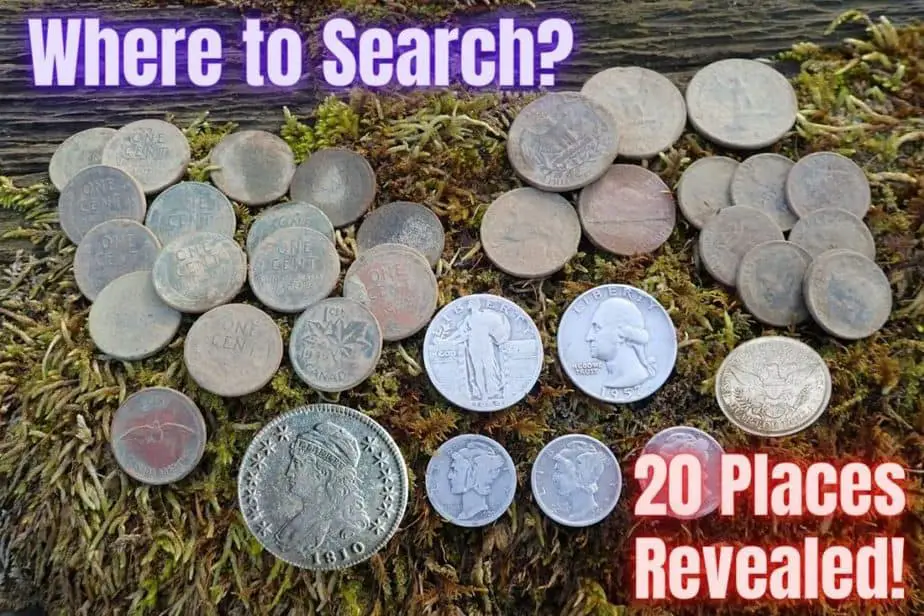
Why Do Most People Give Up on Metal Detecting?
If you are beginning to metal detect or thinking about starting to metal detecting I want you to be aware of these 5 reasons why many beginners give up on metal detecting only after a few short months. Its unfortunate but it happens all the time and many times the person spends hundreds of dollars on equipment and gear only to find out that the hobby isn’t for them. Be smart and don’t over spend until you put some time into the hobby.
Top 5 Reasons Why Most People Give Up On metal Detecting.
- Most beginners expect to find silver and gold coins, treasure, or something else worth value etc. But in reality, finding those items rarely happens. They find metal detecting to be boring and it can be. But the truth is if you aren’t digging up something good every once in a while you will tend to feel the same way. Its natural and it happens more than you can imagine.
- Many beginners have a hard time acquiring good permissions and give up after a few short weeks. Most people have a fear of knocking on doors to ask for permission metal detect. Therefore, most people will start out in parks, playgrounds, etc. These places are the same places everyone else has probably detected as well. If you are afraid to talk to people and/or knock on doors then this probably isn’t the right hobby for you.
- Many beginners who try to metal detect never take the time to learn how to properly use their metal detector. Most people who have never tried to metal detect think that all you need to do is turn on the machine and go. While some metal detectors operate this way, most need to be ground balanced before the machine will operate properly. Failure to ground balance the machine could make the metal detector act erratically. This can be very frustrating to deal with.
- Some beginners get angry at other detectorists for not sharing their permissions. The truth of the matter boils down to this, most detectorists work hard for their permissions. They did the hard research and knocked on the doors. They probably don’t want to give you their permission so don’t ask them to.
- Some folks find metal detecting to be boring and lose interest. Sometimes it can get boring. If you aren’t digging up something good every once in a while you will tend to feel the same way. Its natural and it happens more than you can imagine.
I wanted to point out these reasons because if you know about these issues early on, then you know what you are up against and hopefully this article will help you make better decisions on whether or not metal detecting is for you.
Don’t Give Up! Enjoy The Hobby.
This article has provided a wealth of information for anyone who is thinking about giving metal detecting a try. I highly encourage you take the information above and use it to your advantage. Get out there and enjoy this hobby. Take your time and learn your machine. There is plenty of treasure out there waiting to be found. Get out there and get yours!
Thanks for reading – (Scott) Mental Metal Detecting.
Who Can You Trust When Purchasing Your Metal Detector and Gear?
If you think one of these metal detectors is for you, your friend, your child etc., we recommend reaching out to Fort Bedford Metal Detectors. They have some of the best package deals around. We’ve been recommending Fort Bedford for several years. They provide the best deals, service and amazing support. Plus, their shipping is fast and they offer a military discount. Give them a call and tell them Mental Metal Detecting sent you.

Mental Metal Detecting is a participant in the Amazon Services LLC Associates Program, an affiliate advertising program designed to provide a means for sites to earn advertising fees by advertising and linking to Amazon.com. Mental Metal Detecting also participates in affiliate programs with Bluehost, ShareASale, and other sites. Mental Metal Detecting is compensated for referring traffic and business to these companies.

